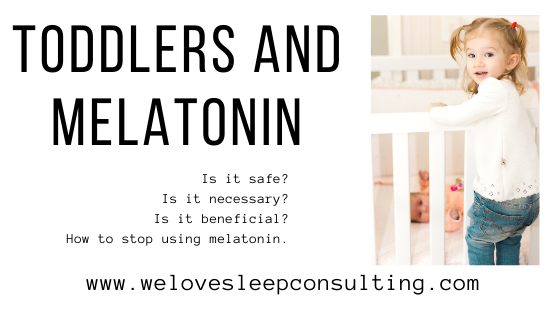|
Parents all want that magic pill to get our kids to instantly go to bed without whining or stalling, sleep 12 hours straight, and wake up happy in the morning. Or maybe a magic pill to make them eat all their food without complaining too . . . right? If you find one like that, tell me about it!
I've been the mom who has fought with her toddlers for hours to get them to go to bed, all while going over a list in my head of things I needed to get done as soon as they were asleep. I've been the mom, dreading bedtime because I knew it was going to be a battle. And I've also been the mom who gave her toddlers melatonin every night for months. And while it may have put a bandaid on the problem and solved it in the short-term, it didn't solve the root of their sleep issues. That's what sleep training does. What is melatonin? Melatonin is a natural hormone our bodies make that tells us we're getting sleepy. It helps regulate our circadian clocks and our wake/sleep cycles. The over-the-counter form of melatonin you can buy in gummy or liquid form for your kids is a synthetic form of the hormone that mimics our natural melatonin. Is it safe? If you've already given your toddler or child melatonin or if you're considering it, here are a few things to consider about melatonin:
Is it necessary and beneficial? Melatonin supplements (with you doctor's consent) can help kids fall asleep quickly, but the good news is - kids don't need melatonin supplements, because their bodies already make it naturally. You can help encourage their bodies to produce melatonin naturally and end their bedtime battles, so they can go to sleep easily and quickly, and stay asleep all night long, all without giving them supplements! How to Get Your Kids to Sleep Without Melatonin After the 2 year sleep regression, when my kids were struggling at bedtime and taking a long time to fall asleep, I did give them melatonin every night. But once I discovered the natural ways to help them get to sleep easily, I cut the melatonin cold turkey one night and applied bedtime sleep training methods (they were both already sleeping through the night). After a few nights of consistency and patience, they caught on quickly and began to go to sleep on their own, within minutes of being laid down, without a bedtime battle and stay asleep for 11-12 hours. It is possible! It just takes consistency and intentionality. We do still have melatonin gummies for kids on hand, for situations where they may need extra help (such as traveling, days when their schedule is off track, etc.), but we honestly haven't used it in many months. They don't need it. They never did need it; I just didn't know how to help them get to sleep easily without it. Things that will help your kids get to sleep without melatonin:
Many bedtime battles take place because a child relies on a parent to get to sleep. The child doesn't know how to get to sleep on their own, or may have regressed into an old habit of needing to be rocked to sleep, patted to sleep, or have a parent's presence to get to sleep. They may have gotten into the habit of asking for water five times before bed, needing more and more engagement from the parent, asking for snacks, or doing anything they can to manipulate or drag out the bedtime process. It's not only exhausting for parents, but it interferes with the child's sleep and can have many negative effects on them. I've worked with families who have kids who went from hours of bedtime battles and frustration every night, to falling asleep on their own, without crying, within minutes of being laid down. When you start sleep training, prepare to be consistent, committed, and intentional. Don't just wing it; go in with a plan. If you need help, I would love to help walk you through this process. Reach out if you want to know more about my services. Unfortunately, I don't have a magic pill for getting kids to go to sleep quickly, quietly, and easily, all on their own, and stay asleep all night. But sleep training is the next best thing! It's almost like magic. *NOTE: This is not medical advice; seek your doctor's recommendation before you give anything to your child.
9 Comments
David Kautz
9/17/2020 09:49:23 am
My girlfriend's son is 7 and she has been trying to wean him off of melatonin. He sleep walks, and has a hard time falling asleep already. It's been very hard for her and I was wondering if you had any more resources for me to give to her about how she can get the little guy to sleep.
Reply
10/27/2020 10:53:30 am
Hi David, I would love to help! I don't normally work with 7 year olds, but I can offer some advice! Feel free to check out my services and support packages and you can send me an email through the "Contact" part of the site!
Reply
Krysta Kuefler
1/13/2021 05:58:53 am
Our daughter is 5 and she can’t shut down at bedtime. We’ve been giving her much less than 2mg of melatonin for about 6 months. It works wonders but recently we’ve tried to wean her off. She needs water, more to eat, pillows aren’t right. Her room is completely dark. I’d love to chat with you or get suggestions on how we could make this an easier process for everyone.
Reply
Lynne Howard (sleep consultant)
1/13/2021 11:22:28 am
Hi Krysta, thanks for reaching out! I'd love to chat and help with getting her sleeping better! It sounds like she lacks skills for independent sleep. Sleep training will help with this! Feel free to shoot me an email if you want to talk! [email protected]
Reply
Andrea & Abdul
6/5/2021 10:17:28 pm
Hi! We have a 17 months old son who struggled before bed and now doing fine on melatonin. However, we are looking to hopefully continue without the supplement. We would love to chat with you about a sleep training plan. Thank you!
Reply
Jeff Weinberg
10/20/2021 07:31:52 pm
Our son is 8 and has been on melatonin for a year. We tried tonight (on a Wed school night) to not give him melatonin and it has been 2 hours and cannot fall asleep. He went to bed the same night as any other school night. We tried making sure room is dark, read books (on my iPhone) to him. Played lullaby music, made sure he went to the bathroom, told him firmly no talking or making noises. My wife is giving in tonight and giving him melatonin.
Reply
Lynne Howard
10/21/2021 04:09:14 am
Hi, Just keep in mind that 2 hours is very normal for night one of weaning from melatonin! If you give in the next night with melatonin, it will only take longer and make it worse, because your child only learns that you’ll give in. If you stick with it and stay consistent, your child will learn to get to sleep without. Keep the iPhone off- the light from the phone (even on night mode) will inhibit your child’s natural melatonin production and make it harder to get to sleep. No screens at all within a few hours of bedtime. Keep the lights dim before bedtime, and very dark at bedtime. A calming bedtime routine is good!
Reply
jeanie
7/27/2022 11:52:33 pm
WE do all this, still is restless trying to go to bed.
Reply
Leave a Reply. |
Lynne HowardPediatric Sleep Consultant Archives
June 2023
Categories |


 RSS Feed
RSS Feed
